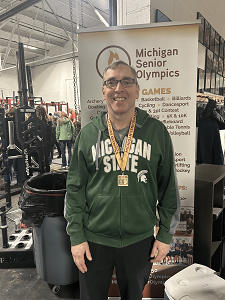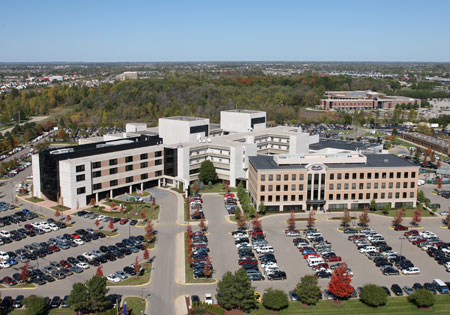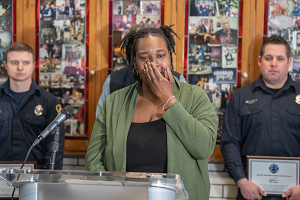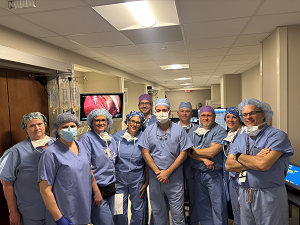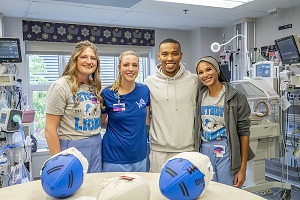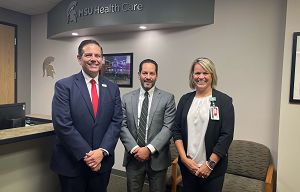First TAVR Successfully Performed at Henry Ford Allegiance Health

Alternative to Open-heart Valve Replacement Now Available Locally
Jackson, Mich. — Doctors performed the first catheter-based replacement of an aortic heart valve today at Henry Ford Allegiance Health, part of the nationally recognized transcatheter aortic valve replacement (TAVR) program of Henry Ford Health System's Center for Structural Heart Disease. TAVR is a minimally invasive alternative to open-heart valve replacement surgery.
The first Henry Ford Allegiance TAVR patient is an active 86-year-old Jackson man diagnosed with aortic stenosis. While working on his farm, the patient was experiencing lifestyle-limiting shortness of breath. Testing showed calcification and narrowing of his heart’s aortic valve opening was restricting blood flow and could have eventually led to heart failure or stroke.
Led by Henry Ford interventional cardiologists Tiberio Frisoli, MD; Matthew Jonovich, MD; and Usman Khokhar, MD, the TAVR procedure to replace the aortic valve took about 1 ½ hours. Henry Ford Allegiance Health cardiothoracic surgeons Vincent Simonetti, MD, and Mahender Macha, MD, also attended the procedure to offer their planning insight and a surgical option, if needed.
The patient is expected to be released tomorrow. For TAVR patients’ convenience, all follow-up care takes place at Henry Ford Allegiance Health by the highly qualified interventional cardiology team on site.
“This revolutionary procedure to replace a defective heart valve without open-heart surgery brings new hope for people with advanced heart disease,” said Dr. Jonovich, who has been caring for cardiology patients in the area for years. “TAVR is easier on the patient, allows for quicker recovery and, ultimately, can improve the patients’ quality of life.”
TAVR is being done at Henry Ford Allegiance Health’s advanced cardiac catheterization laboratory, equipped with highly specialized imaging and procedural technology. Using thin catheters, the cardiologists access the heart through the femoral vein in the groin region, threading the collapsed valve up through the tubing. Once properly positioned, a balloon expands the valve, pushing back the native valve and lodging the new device in place.
“Patients typically notice improved symptoms shortly after TAVR and can be released as soon as the next day,” said Dr. Khokhar. “Studies are showing TAVR is the safest, most effective option for the majority of patients with advanced aortic valve disease.”
Cardiologists are often able to offer TAVR as an option for those whose advanced age, frailty or degree of heart damage makes open-heart surgery particularly challenging.
“We’re pleased to offer this specialized care for patients at Henry Ford Allegiance Health, after seeing such great results with patients at Henry Ford Hospital in Detroit,” said Dr. Frisoli. “We’ve treated many people with TAVR who have been turned away elsewhere – with fantastic results.”
Also attending the procedure was Henry Ford Center for Structural Heart Disease Medical Director William O’Neill, MD, who performed the first TAVR in the United States in 2005. Since launching the Henry Ford Health System program at Henry Ford Hospital in 2012, more than 1,400 patients have undergone TAVR through the Henry Ford Heart & Vascular Institute.
The interventional cardiology teams from Detroit and Jackson have been working together for months to prepare for the establishment of a TAVR program at Henry Ford Allegiance Health. Every TAVR case requires the presence of a specially trained, multi-disciplinary team that includes expert anesthesiologists, cardiac imaging specialists and support staff.
“South Central Michigan patients now have access to world-class TAVR procedures in their own backyard,” said Dr. O’Neill, one of 51 master fellows out of about 4,500 members in 70 nations of the Society for Cardiovascular Angiography and Interventions.
TAVR is one more option added to the specialized cardiology care offered at Henry Ford Allegiance Health. The Henry Ford Center for Structural Heart Disease program at Jackson also offers balloon valvuloplasty, where a balloon is used to loosen buildup on stiff heart valves, and WATCHMAN™ device implantation to prevent stroke-causing blood clots in patients with atrial fibrillation. Henry Ford interventional cardiologists also offer transcaval access for TAVR, pioneered at Henry Ford Hospital and now used around the world. Transcaval access for TAVR is an alternative way to thread the catheter into the heart for those with smaller veins or other access issues.
“TAVR is an important addition to the comprehensive cardiovascular services offered by Henry Ford Allegiance Health. This is a wonderful outcome of collaboration, trust, respect and focus on serving all of our communities with the highest value possible,” said Mark Smith, MD, Senior Vice President, Medical Affairs & Chief Medical Officer, Henry Ford Allegiance Health.
To make an appointment or learn more about TAVR at Henry Ford Allegiance Health, visit HenryFord.com/structuralheart.
Media Contact:
Dawn Anderson-Meier / dander16@hfhs.org / (517) 262-8917
Tammy Battaglia / tbattag1@hfhs.org / (248) 881-0809
.svg?iar=0&hash=F6049510E33E4E6D8196C26CCC0A64A4)

/hfh-logo-main--white.svg?iar=0&hash=ED491CBFADFB7670FAE94559C98D7798)
